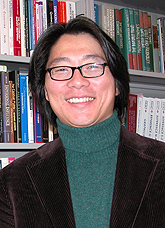Berkeleyan
Politics from the bottom up![]()
| 31 March 2005
To teach Introduction to American Politics (PS 1AC) next fall, Taeku
Lee will include “the perspectives of ordinary people” rather
than focus exclusively on the top government decision-makers who determine
policy. The assistant professor of political science was “jazzed” by
the opportunity to teach an introductory course in U.S. politics because,
he says, his own immigrant experience has shown him that, as a newcomer
to this country, “knowledge of how American government and politics
works can affect your life chances.”
 Taeku Lee (Wendy Edelstein photo) |
Lee, who dislikes the “one-way conversation” endemic to most
large lecture classes, participated in the Mellon Faculty Institute for
Undergraduate Research last summer in order to “be forced to think
about how to redesign a course with the dual aims of making it research-based
and bringing in an American Cultures focus.” Faculty excel at “lingering
over conceptual problems and are much less predisposed to tackle nuts-and
bolts-challenges,” observes Lee, who says the Mellon fellowship
spurred him to draft research-based assignments and reality-check the
feasibility of specific tasks with librarians as part of the syllabus-development
process.
His professional interests — in racial and ethnic politics and survey-based
research — informed some of the exercises he mapped out for PS 1AC.
To investigate “how our Founding Fathers came to the negotiated
document that is the U.S. Constitution,” Lee will assign students
to research the different perspectives of the original delegates to see “whose
viewpoints were taken fully into account, whose were completely absent,
and how the negotiated result occurred. I think it’s impossible
to go through that exercise without getting a good understanding of what
the privileged ethnic categories were at the time and which ones were
invisible.”
In another exercise, students will be asked to fill out a confidential
survey that Lee will use over the course of the semester to “talk
about what’s distinct about them as a population, in terms of how
they think about politics as compared to the country as a whole.”
Lee designed these exercises to accustom students to the practice of taking multiple perspectives on a given issue. “I think there’s a real danger — especially at Berkeley with its history of progressive, left-wing politics — to have the kind of preaching to the choir that insulates our students from what’s going on in the rest of the country,” says Lee. “Keeping in mind the pedagogical imperative of diversity, this could leave our students at a comparative disadvantage once they venture beyond the safe haven of Sather Gate — even if in defense of progressive, left-wing political ideas.”

